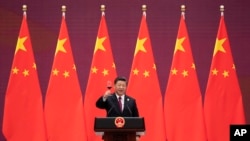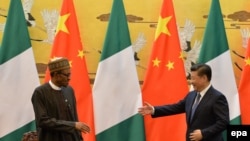On November 2, Chinese Foreign Ministry spokesperson Hua Chunying posted a chart on her Twitter account indicating that China’s image among people in Mexico, Saudi Arabia, Egypt, South Africa, Kenya and Nigeria had improved between 2021 and 2022.
The data came from the YouGov-Cambridge Globalism Project, an annual survey of international opinion in select countries that’s been conducted since 2019.
In her tweet, Hua wrote: “China's development strengthens the world's forces for peace – a truth widely known in the developing world.”
The chart’s headline read: “China is increasingly seen as a positive force.”
The problem is that Hua cherry-picked the survey results to choose a time frame that made China look good, when in fact the country’s image is worse than when the survey began in 2019.
As such, the tweet is misleading. Let’s break it down.
The 2022 U.K.-based YouGov-Cambridge Globalism Project polled more than 1,000 adults in 25 countries. This year’s survey was conducted between August 24 and September 22 and included a mix of Western democracies and developing countries in the global south.
One question, posed about China, the United States, Britain, Russia, Brazil, Japan, France, India, Saudia Arabia and Iran, asked if the country had “a positive or negative effect on world affairs.”
Hua’s chart accurately showed that China’s positive rating improved in 2022 from the prior year among the developing countries she highlighted. Still, the new ratings are worse than 2019 in each country except Kenya, which wasn’t surveyed in 2019 or 2020.
Here are the survey results for all four years in the countries Hua highlighted showing the percent of respondents with a positive view of China:
What about other countries? China’s positive rating plummeted from 2019 levels in France, Germany, Sweden, Denmark, Spain, Italy, Greece, Poland and Great Britain. Greece and Hungary weren’t polled in 2019, but they now are less positive on China than in the 2020 survey.
Among developing countries Hua did not list, positive views of China in Turkey dropped from 55% in 2019 to 28% in 2022; in India, from 44% to 23%; in Brazil, from 65% to 50%; in Indonesia, from 57% to 53%; and in Thailand, from 71% to 66%.
A majority of people in the developing countries surveyed – with the exceptions of Egypt and Saudi Arabia – also agreed that China had “tried to cover up the truth about the origins of coronavirus.”
On this question, the biggest majorities were in countries with more positive views of China, such as Nigeria, South Africa and Kenya, where China has deep business ties and built and financed a multi-billion dollar, debt-plagued, railway from Nairobi to Mombasa.
Most developing countries surveyed ranked China at the top among countries that have “put hundreds of thousands of its own citizens, or more, into mass prison camps, without fair and proper legal process,” ahead of authoritarian regimes in Russia, Iran and Saudi Arabia.
In the 2021 survey, respondents in developing countries put China at the top of the list of countries that have “used military force to threaten the territorial rights of neighboring countries in its region,” with Russia coming in second. However, with the invasion of Ukraine in February, Russia topped the list this year.
Notably, although attitudes toward China were significantly more positive in the developing world than they were in the West, most of those in the developing countries identified the United States as “the most powerful force in world politics.”
Respondents in African countries surveyed chose the U.S. over China as leading power in world politics.
“[D]espite Beijing’s no-strings loans and large infrastructure projects as part of President Xi Jinping’s Belt and Road Initiative, African support for the U.S. remained slightly higher,” Voice of America (VOA) reported on the 2022 survey in October.
“Results from the African countries in this study stand out for how they reflect such positive views toward both America and China as actors on the world stage,” Joel Rogers de Waal, academic director at YouGov, told VOA in October.
“At the same time, however, they show an obvious preference for having America, rather than China, as the reigning superpower, which perhaps raises some interesting questions about the progress of Chinese soft power in these parts of Africa.”
The YouGov-Cambridge survey showed global support for helping Taiwan if Beijing decides to annex the self-ruling democratic island by force.
That was true even in developing countries that hold strongly positive views of China. For example, 63% of Kenyans and 60% of Nigerians surveyed said they believed that “other countries should provide help to Taiwan” if China annexes the island by force.
“Public opinion is often not as binary as the policy debate might suggest,” Rogers de Waal told The Guardian newspaper in October. “It may be that plenty of people are capable of having both a sympathetic view towards the defense of Taiwan, and a favorable one towards China as a powerful force within the international system – albeit not as an outright alternative to it.”
Pro-China sentiment has declined most dramatically in Western democracies, the survey showed.
Positive sentiment about China fell over the past four years from 27% to 18% in the U.S., 35% to 11% in the U.K., 30% to 13% in Germany, 36% to 17% in France, 32% to 11% in Denmark, and 41% to 24% in Italy.
That decline has been registered by other large global surveys.
“There is no one reason for China’s plummeting global image. It stems from a combination of poor diplomacy, the increasing use of economic coercion, its failing soft power efforts, and its growing ties to Russia, among other factors,” Joshua Kurlantzick, an analyst at the Council on Foreign Relations think tank, wrote for The Diplomat magazine in July.
Experts credit the deterioration to China’s strict handling of the COVID-19 pandemic, human rights abuses, military expansion in the South China Sea, crackdown on Hong Kong democracy, aggression toward Taiwan and Xi's authoritarian rule.






